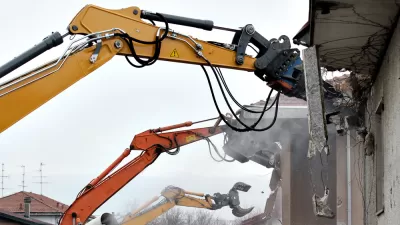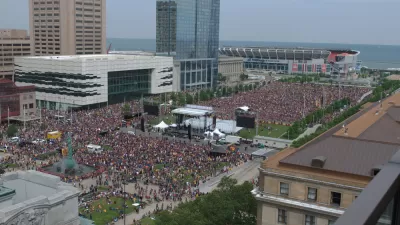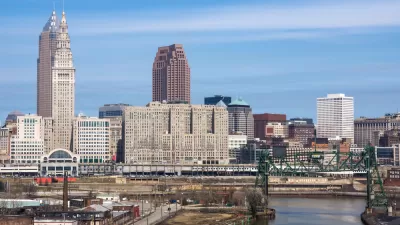In a piece for CityLab, Richey Pipparinen argues that trigger-happy city officials need to slow down their push to demolish homes.

Shrinking rust belt cities often manage decline by getting rid of vacant housing. In the short term, that means unsightly and unloved buildings are demolished or literally burned down in some cases. "The problem, of course, is that if you manage decline you are likely to get, well, decline," Richey Pipparinen writes for CityLab. Pipparinen reports that, increasingly, studies are showing that this strategy doesn't lead to turnarounds and neighborhoods that have dramatically reduced their housing did not see their housing market bounce back.
"Perfecting managed decline is an example of the 'fallacy of the first attitude,' a term Lewis Mumford used when describing how leaders make decisions on the assumption that yesterday’s trend lines will carry on indefinitely," Pipparinen argues. Instead of adopting a defeatist attitude toward cities and neighborhoods, city officials would do better to use their existing assets to prepare for a future that is uncertain—for growing and shrinking cities alike.
FULL STORY: 'Smart Decline' Is Dumb

Alabama: Trump Terminates Settlements for Black Communities Harmed By Raw Sewage
Trump deemed the landmark civil rights agreement “illegal DEI and environmental justice policy.”

Planetizen Federal Action Tracker
A weekly monitor of how Trump’s orders and actions are impacting planners and planning in America.

Why Should We Subsidize Public Transportation?
Many public transit agencies face financial stress due to rising costs, declining fare revenue, and declining subsidies. Transit advocates must provide a strong business case for increasing public transit funding.

Understanding Road Diets
An explainer from Momentum highlights the advantages of reducing vehicle lanes in favor of more bike, transit, and pedestrian infrastructure.

New California Law Regulates Warehouse Pollution
A new law tightens building and emissions regulations for large distribution warehouses to mitigate air pollution and traffic in surrounding communities.

Phoenix Announces Opening Date for Light Rail Extension
The South Central extension will connect South Phoenix to downtown and other major hubs starting on June 7.
Urban Design for Planners 1: Software Tools
This six-course series explores essential urban design concepts using open source software and equips planners with the tools they need to participate fully in the urban design process.
Planning for Universal Design
Learn the tools for implementing Universal Design in planning regulations.
Caltrans
Smith Gee Studio
Institute for Housing and Urban Development Studies (IHS)
City of Grandview
Harvard GSD Executive Education
Toledo-Lucas County Plan Commissions
Salt Lake City
NYU Wagner Graduate School of Public Service





























